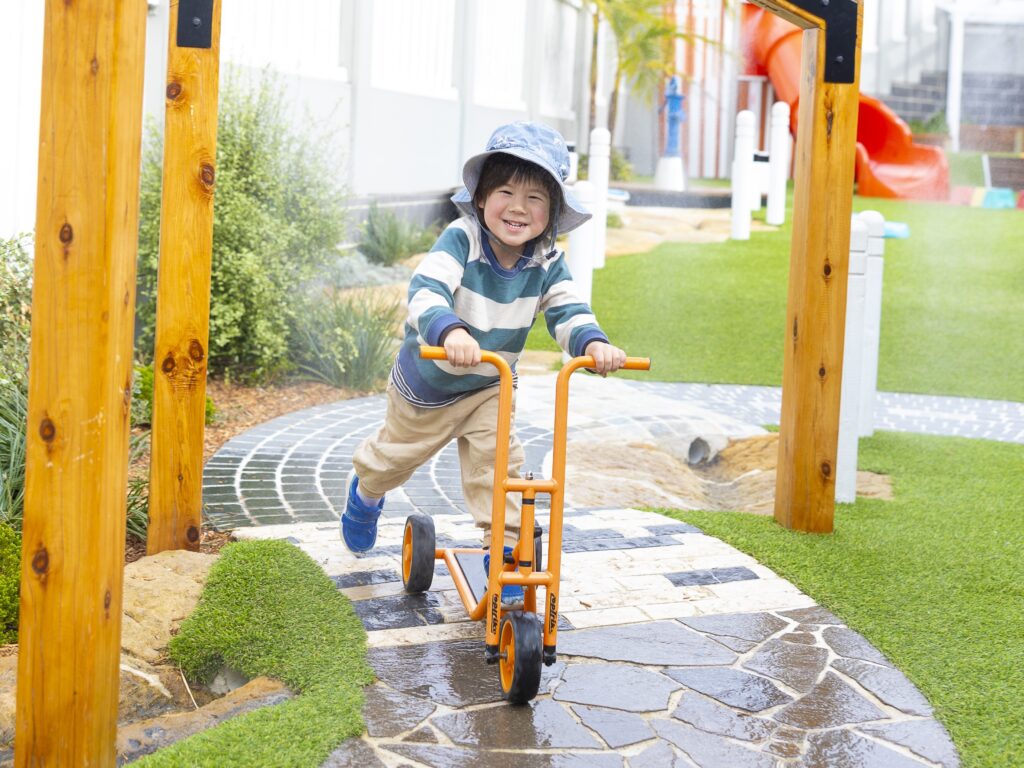 Book a Tour
Book a Tour WhatsApp
WhatsApp Join Waitlist
Join Waitlist
Every child deserves the best start in life, especially during the crucial first five years. While it took Australia a little while to formally recognise this, we now have the Early Years Learning Framework (EYLF) to guide educators in supporting children under five years. But let’s remember, raising healthy, happy children isn’t just the job of governments or educators—it’s something special and joyful for all of us who care for them.
Nature really knew what it was doing when it created children! Sometimes, being healthy means getting messy—whether they’re playing in puddles, pouring milk over the edge of their highchair, or inspecting plant roots after pulling up their favourite flower. These curious little moments aren’t just random or annoying accidents. They are vital learning experiences that keep children’s development on track.
This kind of curiosity helps children learn and grow into resilient, motivated adults. Believe it or not, that same energy is what keeps us from getting stuck in life’s ruts later on. Encouraging a child’s natural curiosity and sense of adventure builds the kind of confidence, resilience, and emotional strength they’ll carry with them throughout life. So, next time your little one stuffs something down the toilet or creates a “gourmet” breakfast out of tomato sauce and dirt, remember—they’re not being naughty. They’re just children navigating their feelings and learning how the world works.

Let Children Be Children
Here’s the thing: real children need real experiences. Dirt, trees, water, pets, people—these are the essentials for growing up healthy and happy. Getting dirty, wet, and making messes in the playroom isn’t just fun for children—it’s how they learn the intricate patterns and nuances of life. Even better, involving them in cleaning up afterwards teaches them another life skill.
The EYLF gets this. Its five learning outcomes are all about helping children build the essential skills they need to thrive:
1. A strong sense of identity
2. Connection to and contribution to their world
3. A strong sense of wellbeing
4. Confidence as learners
5. Effective communication skills
The framework’s focus on play-based learning is a game-changer. It means we can all relax, knowing that when children play, they’re on the right path to a healthy, happy future.

Whether they’re spinning around with their arms out, rolling down hills, or tumbling over couches, they’re doing exactly what their brains need to grow. Play helps build vital parts of the brain, like the cerebellum, which is key for sensory processing. Children seem to instinctively know what they need to thrive. A basket of clothes pegs or recycling boxes can keep toddlers busy for hours because they’re hard at work making those crucial brain connections. As adults, it might look boring or pointless, but for them, it’s pure magic. Here at Heritage House, we embrace loose parts play for this very reason—it fosters creativity and critical thinking, helping children explore the world on their own terms.
Resilience Is Learned Through Experience
One of the most important things children learn through play is resilience. Life will always have bumps, bruises, and challenges, and children who face these things head-on in childhood are better equipped to handle them as adults. Whether they’re frustrated because someone else has the bike they want or struggling to complete a puzzle, these moments teach children how to cope with disappointment and try again.
They also learn that accidents are a part of life. Scrapes and bruises aren’t a sign of bad parenting—they’re part of a healthy, adventurous childhood! These little bumps help children learn to manage risks, build confidence, and bounce back from setbacks.

Nurturing Curiosity and Confidence
Children are naturally curious, and that curiosity is something we should encourage at every turn. Too much screen time and overly structured play can actually dampen this vital brain development. So, let’s keep the gadgets to a minimum and encourage children to get out there and play with cardboard boxes, blocks, and all the simple things that ignite their imaginations.
In a world where resilience is more important than ever, the EYLF gives us a framework to nurture confident, curious, and capable children. It’s all about keeping things simple, letting children play, and remembering that childhood is sacred. After all, it’s through life’s little messes and adventures that children grow into happy, healthy, and resilient humans.

Childcare settings such as Heritage House offer a secure environment where children can explore and take risks. Book a tour and come explore how we can provide your child with the freedom to try new things, make mistakes, and learn from them.